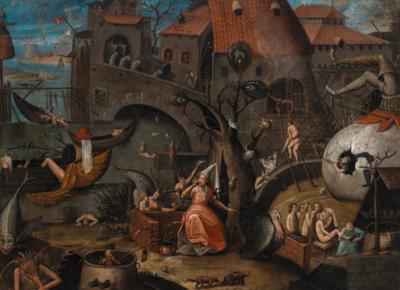Follower of Pieter Brueghel I

An Allegory of Envy,
oil on canvas, 85 x 115 cm, framed
Provenance:
sale, Dorotheum, Vienna, 23 October 2018, lot 126 (sold for €222,600);
Private collection, United Kingdom
The present painting is based on a series of seven etchings by Pieter van der Heyden after designs by Pieter Brueghel I, published in Antwerp by Hieronymus Cock in 1556–57, known as The Seven Capital Sins. An Allegory of Pride, with similar measurements, was sold at Dorotheum, Vienna, 10 November 2020, lot 20.
Following his return from Rome, the series established Brueghel’s fame as the heir to Hieronymus Bosch (circa 1450–1516), and are also considered the finest example of van der Heyden’s engraving work. The canonisation of sins was codified in the sixth century by Pope Gregory the Great consisting of Superbia, Ira, Invidia, Avaritia, Acedia, Gula and Luxuria, and the theological discourse over sins intensified during the Reformation, providing the right market conditions among both Protestants and Catholics for Cock to commission such an ambitious series. An innovation of Brueghel was to offset the Boschian demonic forms and outlandish architecture with genre-like scenes that evoked life in mid-sixteenth century Flanders.
In the present canvas, the central figure of the lady, attended by her turkey (Brueghel uses a central, allegorical woman embodying the sin in each of the series), spurred on by demons devours her own heart. This likely relates to a proverb that when one is envious of someone they ‘eat their heart out’. The turkey had only recently been introduced to Europe from North America, and shows Brueghel’s iconographic inventiveness. The idiom alluded to by the queue at the shoemaker on the right is not certain, but likely refers to ‘the shoe being on the other foot’ or contemplating and envying others’ positions and situations.
In the print from which it derives the Latin inscription reads ‘INVIDIA HORRENDVM MONSTRVM, SÆVISSIMA PESTIS’ which translates as ‘Envy is an abominable monster, the grimmest disease’. Then Flemish verses below: ‘Een onsterffelijcke doot es nijt / en wreede peste Een beest die haer seluen eet / met valschen moleste’ means ‘Envy is eternal death and a cruel disease, a beast that consumes itself with false malice’ Brueghel, whose humanist aspirations led him to drop the ‘h’ from his surname, was long assumed to have worked with Dirck Volckertsz. Coornhert considered the father of Dutch Renaissance scholarship, in devising the Latin inscriptions. However, Maarten Bassens noted that there are some mistakes in the Latin which Coornhert would never have made, suggesting the likely source of these inscriptions was Brueghel’s publisher Hieronymous Cock.
Specialist: Damian Brenninkmeyer
 Damian Brenninkmeyer
Damian Brenninkmeyer
+43 1 515 60 403
old.masters@dorotheum.com
09.11.2022 - 17:00
- Realized price: **
-
EUR 193,994.-
- Estimate:
-
EUR 150,000.- to EUR 250,000.-
Follower of Pieter Brueghel I
An Allegory of Envy,
oil on canvas, 85 x 115 cm, framed
Provenance:
sale, Dorotheum, Vienna, 23 October 2018, lot 126 (sold for €222,600);
Private collection, United Kingdom
The present painting is based on a series of seven etchings by Pieter van der Heyden after designs by Pieter Brueghel I, published in Antwerp by Hieronymus Cock in 1556–57, known as The Seven Capital Sins. An Allegory of Pride, with similar measurements, was sold at Dorotheum, Vienna, 10 November 2020, lot 20.
Following his return from Rome, the series established Brueghel’s fame as the heir to Hieronymus Bosch (circa 1450–1516), and are also considered the finest example of van der Heyden’s engraving work. The canonisation of sins was codified in the sixth century by Pope Gregory the Great consisting of Superbia, Ira, Invidia, Avaritia, Acedia, Gula and Luxuria, and the theological discourse over sins intensified during the Reformation, providing the right market conditions among both Protestants and Catholics for Cock to commission such an ambitious series. An innovation of Brueghel was to offset the Boschian demonic forms and outlandish architecture with genre-like scenes that evoked life in mid-sixteenth century Flanders.
In the present canvas, the central figure of the lady, attended by her turkey (Brueghel uses a central, allegorical woman embodying the sin in each of the series), spurred on by demons devours her own heart. This likely relates to a proverb that when one is envious of someone they ‘eat their heart out’. The turkey had only recently been introduced to Europe from North America, and shows Brueghel’s iconographic inventiveness. The idiom alluded to by the queue at the shoemaker on the right is not certain, but likely refers to ‘the shoe being on the other foot’ or contemplating and envying others’ positions and situations.
In the print from which it derives the Latin inscription reads ‘INVIDIA HORRENDVM MONSTRVM, SÆVISSIMA PESTIS’ which translates as ‘Envy is an abominable monster, the grimmest disease’. Then Flemish verses below: ‘Een onsterffelijcke doot es nijt / en wreede peste Een beest die haer seluen eet / met valschen moleste’ means ‘Envy is eternal death and a cruel disease, a beast that consumes itself with false malice’ Brueghel, whose humanist aspirations led him to drop the ‘h’ from his surname, was long assumed to have worked with Dirck Volckertsz. Coornhert considered the father of Dutch Renaissance scholarship, in devising the Latin inscriptions. However, Maarten Bassens noted that there are some mistakes in the Latin which Coornhert would never have made, suggesting the likely source of these inscriptions was Brueghel’s publisher Hieronymous Cock.
Specialist: Damian Brenninkmeyer
 Damian Brenninkmeyer
Damian Brenninkmeyer
+43 1 515 60 403
old.masters@dorotheum.com
|
Buyers hotline
Mon.-Fri.: 10.00am - 5.00pm
old.masters@dorotheum.at +43 1 515 60 403 |
| Auction: | Old Master Paintings I |
| Auction type: | Saleroom auction with Live Bidding |
| Date: | 09.11.2022 - 17:00 |
| Location: | Vienna | Palais Dorotheum |
| Exhibition: | 22.10. - 09.11.2022 |
** Purchase price incl. buyer's premium and VAT(Country of delivery: Austria)
It is not possible to turn in online buying orders anymore. The auction is in preparation or has been executed already.
